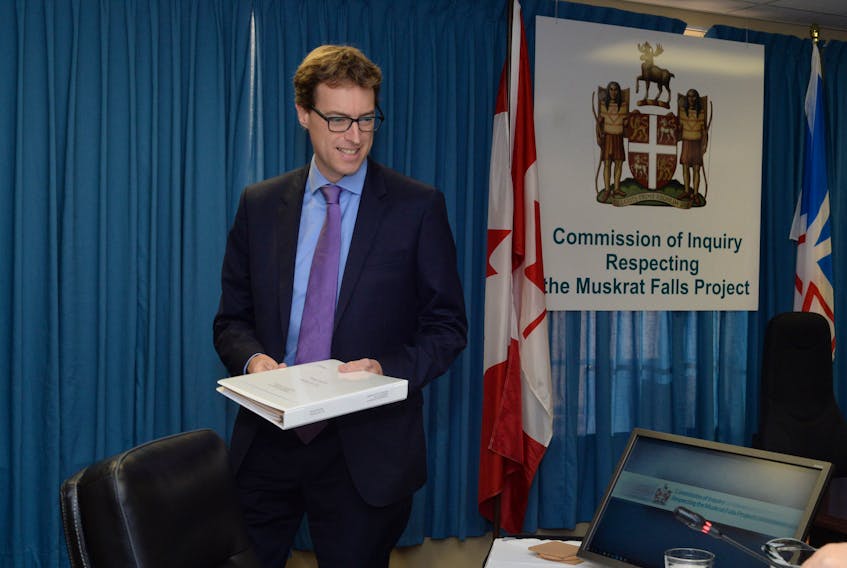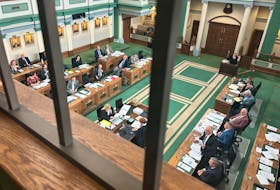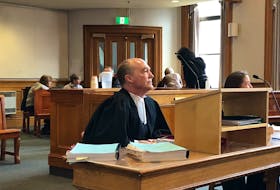Business academic Guy Holburn has told the Muskrat Falls Inquiry the exemption of the project from a full, Public Utilities Board (PUB) review and oversight was not best practice.
“It’s rare for a government to sanction a project without endorsements from a regulatory agency,” Holburn, from the Ivey Business School at the University of Western Ontario, said on the stand Tuesday morning in St. John’s.
Holburn said consultant reports — like reports from Manitoba Hydro International, Navigant, Ziff and others often cited by government in response to questions on pre-project review — are input for consideration, but not substitutes for a regulator’s review.
The review ordered by the provincial government from the PUB in 2011, comparing the “isolated island” option for power with the “interconnected” (Muskrat Falls) option, was restricted to an either-or. It was limited in the time and left the provincial government, as Holburn stated in his formal report to the Commission of Inquiry, “not as informed as it could have been at the time of sanction about the costs and risks of the Muskrat Falls project relative to other alternatives.”
Regulatory oversight and review makes it less likely decisions will carry significant negative, economic consequences, he noted.
“Regulatory agencies in Alberta, Ontario and Nova Scotia have played central roles in evaluating, approving, monitoring and reviewing large electricity infrastructure projects such as Western Alberta Transmission Line, Darlington nuclear power plant refurbishment, and Maritime Link. To date, these projects have largely been completed on budget and on schedule,” he stated, looking at regulatory oversight of projects valued at more than $1 billion in other provinces. “By contrast, in Manitoba, where the Public Utilities Board has had a much more restricted role in evaluating and overseeing the Keeyask generation project, the project is significantly over budget, three years behind schedule, and the focus of political controversy.”
Holburn noted the PUB here did not endorse the Muskrat Falls project as the least-cost option for meeting the province’s power demands. He also noted the provincial-federal Joint Review Panel (JRP) formed for the project’s environmental assessment did not endorse the business case for Muskrat Falls.
His report to the Commission of Inquiry – “The impact of exempting the Muskrat Falls project from oversight by the Newfoundland and Labrador Board of Commissioners of Public Utilities” concluded:
- The approach to regulatory oversight of Muskrat Falls “has not met the high standard that other provinces such as Alberta, Ontario and Nova Scotia have adopted in regulatory oversight of megaprojects.”
- By 2013, the PUB would have had new information on load growth, showing it was lower than forecasted, potentially strengthening concern that “there is not an immediate need for the large incremental supply associated with the Interconnected option (Muskrat Falls) and that Island electricity needs could be met in the short to medium term with available renewable sources on the Island and/or additional thermal generation.”
- In July 2013, the Nova Scotia Utilities and Review Board (UARB) approved the Maritime Link, with a commitment by Nalcor to provide 1.2 terrawatt hours of nonfirm energy on average per year over 24 years. “It is likely that the PUB would have wanted to conduct its own investigation after the UARB’s approval in November 2013 in order to understand the implications for the Muskrat Falls project.”
- The cost estimates in October 2012 were almost 20 per cent higher than the earlier estimates the PUB was working with for its review, “which would probably have reduced the attractiveness of the interconnected option” if analyzed in an unrestricted review.
- A review in 2014 “would have coincided with the dramatic collapse in global oil prices” and, since oil price affected the presentworth evaluations of the “isolated” and “interconnected” power options, making the timing “potentially consequential.”
He said it is ultimately not possible to know with certainty how any of these factors, or a combination of them, would have affected the final decision.
His report also briefly commented on ongoing, independent oversight entities for the Muskrat Falls project, namely the oversight committee that first met in 2014. It was noted the effectiveness of the committee was questioned by EY in a 2017 report, “which noted that it did not receive frequent, independent, expert information on the project, and it operated outside the purview of the board.”
Holburn was certified as an expert witness, in regulation and governance in the energy sector.
He is the only witness scheduled for the day and will be subject to questions from inquiry counsel and cross-examination from other lawyers for parties with standing at the inquiry.
This story will be updated, with a report from the day’s testimony in tomorrow’s print and digital editions.









